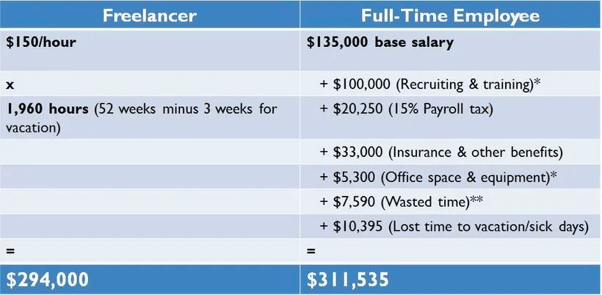Agency vs freelancer: which hiring model to choose for your business?

on May 02, 2023 • 9 minute read

From the dawn of time, people loved doing things in groups. Slaying a mammoth, raising the offspring, building cave-homes — you needed a village to get the big task completed.
Groups exist for a reason. Together, we solve problems better, create products, exchange knowledge, form public institutions, and do other work and fun stuff.
That said, there are always people who cherish their independence. According to self-determination theory, which explores human motivation and personality, autonomy is one of the 3 basic psychological needs (along with competence and relatedness), which are necessary for personal growth and well-being. And we feel autonomous when we do things we enjoy, find important, or valuable.
Our innate craving for autonomy, combined with century-old traditions of organizing in groups, shapes the modern employment culture.
On one side, we have the booming freelance economy, driven by competent independents. On the other — we have traditional workplaces and agencies, which act as a united force (at least most of the time).
That’s a beautiful thing because you get ample choice for acquiring services from the external workforce.
But the question is: who should it be: a freelancer or an agency partner?
This post explores the benefits and drawbacks of both agency and freelancer models with some hot (and warming up) takes.
What is the difference between an agency and a freelancer?
A freelancer is a self-employed professional, catering to multiple clients on a project-by-project basis. Unlike full-time employees, freelancers don’t have an exclusive working relationship with one company and pay taxes independently.
An agency is a group of professionals who operate as one legal entity (a vendor). Agencies typically deliver scoped, deliverables-based services to other businesses (B2B agencies) and individuals (B2C agencies).
The main difference between an agency and a freelancer is the scale of operations. Freelancers mostly work solo. Although some may hire subcontractors or team up with other freelancers for a larger project (e.g., act as designer + copywriter duo).
Agencies employ a group of professionals across roles, ranging from management (e.g., Account Executive) to strategy (e.g., Creative Director) to execution (e.g., social media marketer). With more people on board, agencies can deliver a wider range of services and take on larger, more complex projects, requiring end-to-end implementation.
Compare the two scopes of services:
- A freelance designer can create a front-end design for your mobile app, based on provided specs and user research.
- A digital agency can conduct market and user research, create app UX/UI, and develop backend functionality.
That said, some freelancers view the agency model as their next career stage. For example, 48% of designers, surveyed by 99designs in 2022, want to establish their own studio or agency within the next 5 years.
“Upscaling” to an agency makes sense for freelancers, who’re consistently facing high service demand and/or want to switch from tactical to strategic work (i.e., advise and manage, rather than only execute the work).
But many freelancers are also happy to remain solopreneurs aka a one (wo)man operation. Over half of freelancers globally say they already out-earn their full-time salary but enjoy better work-life balance and flexibility. Another survey by Groove suggests that 73% of solos work 7 hours or less per day (of which 39% work 5 hours or less).
Ultimately, being a freelancer is both a career and a lifestyle choice knowledge workers have made.
TL:DR: Comparison table of freelancers vs agencies
Here’s a quick snapshot of how freelancers compare to agencies when it comes to delivering services.
|
Freelancer |
Agency |
|
|
Management overheads |
➕Proactive briefing and knowledge sharing are required at earlier stages. Alignment gets easier over time when you establish a relationship with the freelancer(s) ➖Running a bigger freelance team can become hectic without lean processes for onboarding, payments, and supervision. |
➕Good agencies take the time to understand your business, its needs, and goals during the proposal stage, resulting in a faster time-to-value for services delivery ➖Misalignment and inconsistency in quality can emerge over time due to changes in agency personnel and/or policies. |
|
Costs |
↘️Lower minimum budget threshold. More competitive ongoing costs. |
↗️Higher minimum budget threshold and totals, but volume discounts may apply. |
|
Flexibility |
⬆️You can hire freelancers on short-term contracts or a per-project basis without much ongoing commitment. |
↗️Some agencies may require extra ramp-up time to increase service coverage and add new service lines. |
|
Diversity of services |
↕️ Depth > breadth |
↔️ Breadth > depth Agencies strive to increase the range of services to attract higher-priced projects and retain existing clients. But service lines may be of different quality. |
|
Turn around time |
🕗As solo operators, freelancers require more time to deliver projects, especially the more complex ones. |
🕒Agencies can deliver work faster thanks to team effort and effective operational practices. |
|
Scalability |
➕ You can rapidly add new freelancer roles to your organization with an effective management system. ➖Although management overheads will likely increase. Likewise, it’s harder to delegate an entire function (e.g., customer support) to freelancers only. |
➕Agencies can easily take on multi-stage, cross-role projects, requiring targeted team effort. Many have extra partners in their books to provide end-to-end execution. ➖If working with a smaller vendor, you may exhaust the agency’s resources and capabilities. |
|
Compliance |
↗️You’ll need an effective KYC process to minimize exposure to liability, tax, worker classification, and IP risks. |
↘️Standard B2B relationship with shared risks and responsibilities. Low-to-no exposure to tax or compliance risks. |
Pros and cons of hiring an agency
There’s a reason why some agencies are called a “rapid response taskforce” — they come in and get the job done.
Account executives and agency strategies see dozens of similar client problems per day and they know how to solve ‘em fast (or else they won’t have clients in the first place).
The higher agency paycheck covers access to expertise, effective workflows, and repeatable frameworks for delivering whatever it is that you need — new social media strategy + content, a technical SEO audit, or a re-designed website.
On the downside, agencies often get too comfortable with their “tested-and-tried” approaches. A Havas survey of agency clients found that 42% believe their agency partners are getting complacent and 39% believe that agencies only provide traditional solutions to their needs.
Although it’s tempting to “set it and forget it” when it comes to hiring an agency, to get the best results you have to stay involved in relationship management.
Pros of hiring an agency
- High time-to-productivity. Agencies have established frameworks for onboarding new clients and delivering projects. With less ramp-up time and more human resources, you get commissioned services faster.
- Lean workflows. To remain profitable, agencies need to maintain a productive workforce. Therefore, they’re more likely to employ smart process automation and ruthless process optimization to ensure a high pace and quality of deliverables.
- Managed delivery: With agencies you get a “done for you” experience. After the initial briefings, you don’t need to be actively involved in project execution (apart from providing occasional feedback). The work arrives in a “ready-to-see-the-world” state.
- High scalability. As long as you give a sufficient heads-up, agencies can accommodate large and ambitious projects (plus even hire extra team members for your account).
- Wider service range. If you partner up with a larger agency, you can farm out services across functions — from IT and creative to admin and finance work.
- Outcome-driven collaboration. The best agencies not just commit to high service levels, but often — to specific results. In other words, you’re not just paying for any work, but you invest to achieve specific goals (e.g., 30% traffic increase) and KPIs (e.g., 10% reduction in ad budget waste).
Cons of hiring an agency
- Inconsistent quality. Each agency has a slightly different spin on delivering services, so the scope, level of commitment, and end quality can differ sometimes.
- Misalignment risks. Almost half of agency clients indicate a disconnect between what they need and what agencies are offering.
- High TCO: Retaining an agency often for long-term costs more than establishing the same function in-house or running a team of freelancers.
- No service standardization. Unless you’re working with a productized company, you’ll have to carefully negotiate all service lines and deliverables each time.
- Largely transactional relationship. It’s money in exchange for deliverables. Not all agencies invest in cultivating meaningful client relationships.
Pros and cons of hiring a freelancer
In 2020, global businesses spent a whopping $4.4 trillion on independent contractors and freelancing services. And there are some good reasons for that.
Freelancers are highly-trained professionals: 50% of EU-based freelancers have over 8 years of experience as independents in their field of work. And that’s on top of some earlier corporate career tenure.
In other words: When hiring freelancers you get access to substantial expertise, but on a more flexible, cost-effective basis (and yes, even if they ask for $150/hour).
Michael Solomon did some quick math, comparing the freelancer vs full-time employee costs:

Source: Medium.
The above math assumes that a freelancer will work the same number of hours as a full-time staffer, which is rarely the case. On the contrary, freelancers choose to engage in project-based work, where they commit to specific tasks and deliverables (rather than just hours). Meaning that you’re paying for outcomes, not just presence or availability.
On the downside, you’d have to get more hands-on with management. Freelancers thrive on clear, concrete instructions. Yet, 66% admit that the majority of client briefs they receive are incomplete or lack clarity. So freelancers have to go through a lot of back and forth before they can start working, which is not only a waste of their time, but also of the client's.
If you feel slightly intimidated by the prospects of managing freelancers, check this guide to creating a great freelance team synergy.
Pros of hiring a freelancer
- On-demand access to expertise. Flexibly acquire the skill sets you need for your project without worrying about payroll overheads or talent retention.
- Flexible staffing. You can test out a bunch of freelancers before committing to your top choice(s) before booking ongoing services (or signing up for a retainer). Whether you want to test-drive TikTok as a marketing channel or get your email onboarding sequence refreshed, you can easily do so.
- Full integration into your processes. Freelancers can become an organic extension of your in-house team and develop substantial knowledge of your brand, company, and internal processes.
- Great tactical execution. Because freelancers are pros in a specific area, they can deliver a high level of service. When it comes to specific, well-structured deliverables, it’s hard to match the level of consistency top freelancers can deliver.
- Long-game relationship. Freelancers love and cherish their “anchor clients” — people, who commission their services year-on-year. By cultivating a strategic partnership with a freelancer, you get a dedicated, efficient, and highly-motivated partner for the long term.
- Excellent price-to-value ratio. When you factor in the overheads of full-time employees, plus the approx dollar value for their output, you’d realize that freelancer services are much more competitively priced.
Need some more arguments? Learn about other benefits of hiring freelancers as a business.
Cons of hiring a freelancer
- Bounded expertise: Freelancers are pros in a specific niche, but may not be as well-versed in adjacent ones (e.g., illustrators rarely take UX/UI projects).
- Fixed service scope: You cannot farm out everything to one freelancer, but rather cherry-pick certain tasks and/or steps in your workflow to delegate.
- Limited availability: Even superhero freelancers have a finite number of hours in their days. Few are available on short notice and for due-for-yesterday projects.
- Managerial overheads: You’ll have to master async comms and be very precise with instructions, especially as distributed teams get bigger.
- Complex compliance: Ensuring proper worker classification and timely payouts can be hectic without a freelancer management system (FMS).
So when to hire an agency?
It makes the most sense to hire an agency when you:
- Require tactical input. Agencies do a better job of eliciting requirements and formalizing the client’s vision for the project. They come with a set of frameworks for project initiation, delivery, and quality control, resulting in fast ramp-up and production of work that matches your expectation.
- Have a larger project. Freelancers are great for covering specific tasks (e.g., blog post writing). Agencies can take over several steps within a workflow (e.g., content strategy + editorial planning + blogging + content promotion).
- Want minimal supervision. With agencies, your input is mostly required at the briefing/proposal stage and then at the delivery stage (with occasional check-ins in between). In some cases, you set an entire function (e.g., social media management) on agency-led auto-pilot and channel your efforts to other tasks.
And when to hire a freelancer?
It makes the most sense to hire freelancers when you:
- Need on-demand expertise. Freelancers can plug the temp or ongoing skills gaps in your workforce at short notice. Meaning you can start on projects faster and run some experiments without worrying about talent retention or overheads.
- Have scoped tasks. Freelancers are stellar boots-on-the-ground executioners. They come in and get the task done. However, the farmed-out tasks should come with reasonable, clear, and finite instructions.
- Aren’t ready to take a full-time hire. Perhaps you’re waiting for a new investor funding round or want to get your revenues more stable before putting another person on the payroll. Freelancers are a great fit for interim roles.
It doesn’t have to be an “either-or” option
Freelancers and agencies are both part of the growing external workforce — the bottomless resource of human ingenuity, existing outside of your corporate perimeter.
So the smartest businesses now combine both hiring models: Rely on agencies for larger projects, requiring end-to-end execution, and partner up with freelancers for flexible, task-based service delivery.
Now you can create your own agency-like experience of freelancers and solopreneurs by using Xolo. Xolo combines a freelancer networking hub with an intuitive client finder that matches your unique skills with quality, long-term projects and clients. It’s the tool that makes expanding your freelance business without having to hire a possibility, by letting you work solo or join teams of freelancers to take on bigger projects (plus you can hand-off a lot of admin, accounting and tax reporting tasks to Xolo as well).
About Elena
Elena Prokopets writes content for tech-led companies & software development businesses, marketing to them. Her empathy for the customer, expertise in SEO, and knack for storytelling help create content that ranks well and drives industry conversations.
Elena uses Xolo so she can focus on her solo B2B content writing business without stressing over the compliance and admin overhead.
Related blogs
Subscribe to
our newsletter
and get the latest updates and expert
business tips straight to your inbox.

